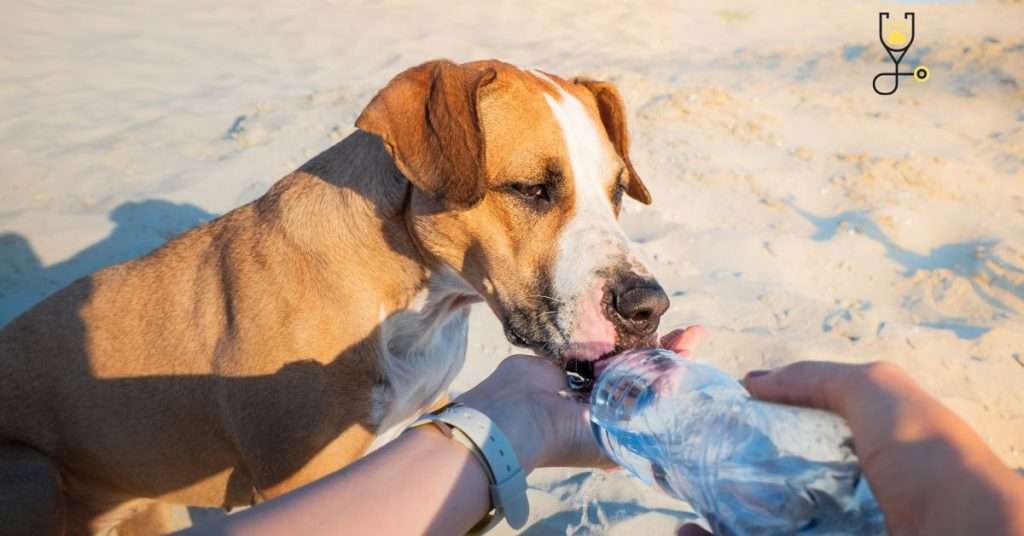Dogs love spending time outdoors, especially when the weather is nice. However, during the hot summer months, it’s important to take steps to prevent your dog from becoming overheated and suffering from heat stroke. Here are a few tips on how to keep your furry friend safe during the summer heat.
What is heat stroke?
Heat stroke is a condition that occurs when your dog’s body temperature becomes too high. This can happen if your dog is left in a hot car, exercised in excessive heat, or does not have access to plenty of fresh water and shade.
Learn More: Liver problems in dogs-Best Guide
Symptoms of heat stroke in dogs
Here are some symptoms of heat stroke in dogs:
- heavy panting: dogs will often pant excessively to try and cool themselves down.
- drooling: dogs may produce more saliva than usual.
- red or purple gums: the gums may become red or purple due to increased blood flow.
- thick saliva: the saliva may be thick and sticky.
- vomiting: dogs may vomit as their body temperature rises.
- diarrhea: diarrhea may be caused by dehydration or an increase in body temperature.
- weakness: as the body temperature rises, your dog may become weak and lethargic.
- collapse: in severe cases, heat stroke can cause your dog to collapse.
- seizures: in some cases, heat stroke can cause seizures.
Potential causes of heat stroke in dogs
There are a few potential causes of heat stroke in dogs:
Hot weather: spending time in hot weather can cause your dog’s body temperature to rise.
Exercise: excessively strenuous exercise can lead to heat stroke, especially if it is done in hot weather.
Lack of water: if your dog does not have access to fresh water, it may become dehydrated, which can lead to heat stroke.
Lack of shade: if your dog is in direct sunlight without any shade, their body temperature can increase to dangerous levels.

Tips to prevent heat stroke in dogs
Here are some tips on how to prevent heat stroke in dogs
1. Avoid hot weather: If possible, try to avoid taking your dog out in hot weather. If you must go out, make sure to go during the cooler hours of the day and bring plenty of water for both you and your dog.
2. Avoid strenuous exercise: If you are going to be exercising with your dog, make sure to do it during the cooler hours of the day and avoid doing anything too strenuous. If your dog is panting excessively, take a break and provide them with water.
3. Provide plenty of water: Always make sure that your dog has access to fresh water, especially if they are going to be spending time outside. You may also want to consider investing in a dog water bottle or bowl that can be easily transported.
4. Provide shade: If your dog is going to be spending time outside, make sure they have access to shade. This can be in the form of an umbrella, tree, or even a doghouse.
5. Know the signs of heat stroke: Be aware of the signs of heat stroke in dogs so that you can act quickly if your dog begins to show any symptoms.
If you think your dog may be suffering from heat stroke, it is important to act quickly.
Read More: Recognize and treat cysts, tumors, and growths in dogs
Things to cool your dog down
-moving them to a cooler area
-applying cool towels to their body
-giving them small amounts of cool water to drink
-taking them to the vet immediately.
Treatment of heat stroke in dogs
If you think your dog may be suffering from heat stroke, it is important to act quickly. Some things you can do to cool your dog down include:
- moving them to a cooler area
- applying cool towels to their body
- giving them small amounts of cool water to drink
- taking them to the vet immediately.

If your dog’s temperature is above 104 degrees Fahrenheit, they will likely receive treatment to lower their body temperature. This may include:
- cooling baths
- intravenous fluids
- oxygen therapy
- close monitoring
After your dog’s temperature has been brought down to a safe level, they will likely be monitored for 24 hours to make sure that their temperature does not rise again. In some cases, heat stroke can cause long-term damage to the organs, so it is important to get your dog to the vet as soon as possible if you think they may be suffering from heat stroke.
Read More: What is Ascites in dogs? History, Causes, symptoms, treatment, and preventions
Conclusion
Heat stroke is a serious condition that can be fatal for dogs if not treated quickly. There are a few things you can do to prevent heat stroke in your dog, including avoiding hot weather, providing plenty of water, and giving them access to shade. If you think your dog may be suffering from heat stroke, it is important to act quickly and take them to the vet immediately.
Learn All About Common Health Issues in Dogs & Their Prevention in our detailed guide here.
FAQs
What are the signs of heat stroke in dogs?
The signs of heat stroke in dogs include panting, excessive drooling, lethargy, confusion, and collapse. If you think your dog may be suffering from heat stroke, it is important to act quickly.
How do I prevent heat stroke in my dog?
There are a few things you can do to prevent heat stroke in your dog, including avoiding hot weather, providing plenty of water, and giving them access to shade.
What should I do if I think my dog has a heat stroke?
If you think your dog may be suffering from heat stroke, it is important to act quickly. Some things you can do to cool your dog down include: moving them to a cooler area, applying cool towels to their body, giving them small amounts of cool water to drink, and taking them to the vet immediately.
What is the treatment for heat stroke in dogs?
The treatment for heat stroke in dogs includes cooling baths, intravenous fluids, oxygen therapy, and close monitoring. In some cases, heat stroke can cause long-term damage to the organs, so it is important to get your dog to the vet as soon as possible if you think they may be suffering from heat stroke.
Can heat stroke be fatal for dogs?
Yes, heat stroke can be fatal for dogs if not treated quickly. If you think your dog may be suffering from heat stroke, it is important to act quickly and take them to the vet immediately.